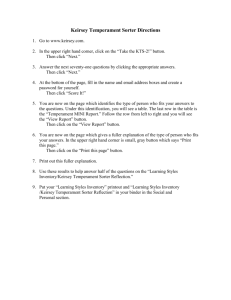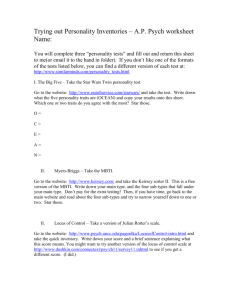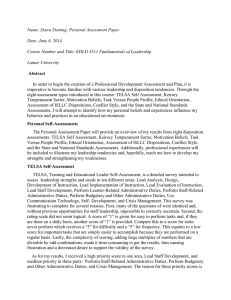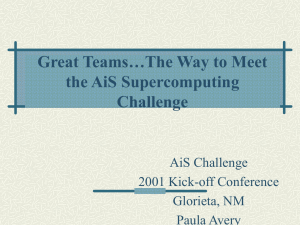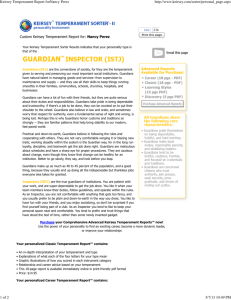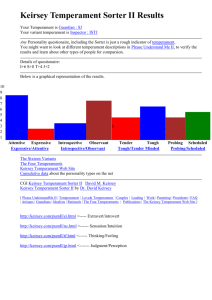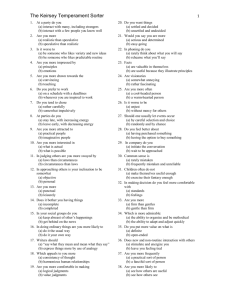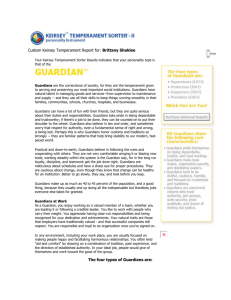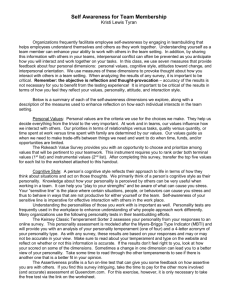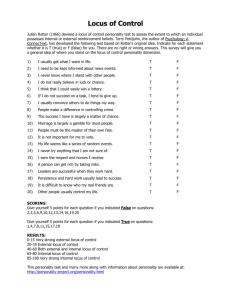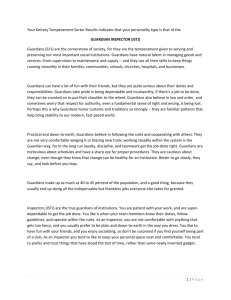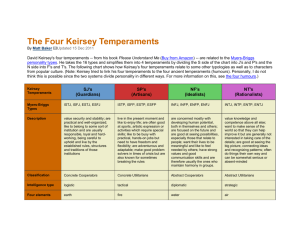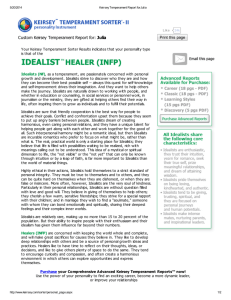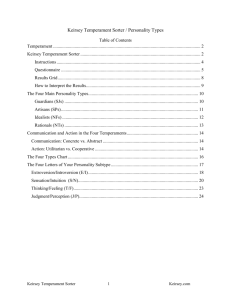Leadership Essay
advertisement
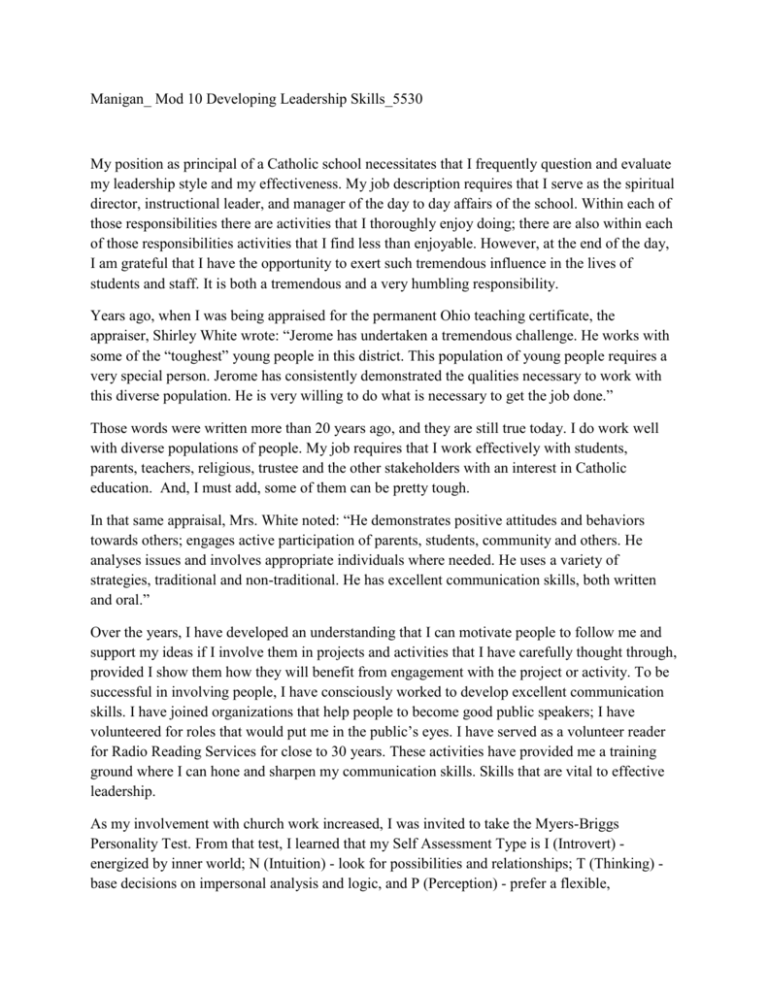
Manigan_ Mod 10 Developing Leadership Skills_5530 My position as principal of a Catholic school necessitates that I frequently question and evaluate my leadership style and my effectiveness. My job description requires that I serve as the spiritual director, instructional leader, and manager of the day to day affairs of the school. Within each of those responsibilities there are activities that I thoroughly enjoy doing; there are also within each of those responsibilities activities that I find less than enjoyable. However, at the end of the day, I am grateful that I have the opportunity to exert such tremendous influence in the lives of students and staff. It is both a tremendous and a very humbling responsibility. Years ago, when I was being appraised for the permanent Ohio teaching certificate, the appraiser, Shirley White wrote: “Jerome has undertaken a tremendous challenge. He works with some of the “toughest” young people in this district. This population of young people requires a very special person. Jerome has consistently demonstrated the qualities necessary to work with this diverse population. He is very willing to do what is necessary to get the job done.” Those words were written more than 20 years ago, and they are still true today. I do work well with diverse populations of people. My job requires that I work effectively with students, parents, teachers, religious, trustee and the other stakeholders with an interest in Catholic education. And, I must add, some of them can be pretty tough. In that same appraisal, Mrs. White noted: “He demonstrates positive attitudes and behaviors towards others; engages active participation of parents, students, community and others. He analyses issues and involves appropriate individuals where needed. He uses a variety of strategies, traditional and non-traditional. He has excellent communication skills, both written and oral.” Over the years, I have developed an understanding that I can motivate people to follow me and support my ideas if I involve them in projects and activities that I have carefully thought through, provided I show them how they will benefit from engagement with the project or activity. To be successful in involving people, I have consciously worked to develop excellent communication skills. I have joined organizations that help people to become good public speakers; I have volunteered for roles that would put me in the public’s eyes. I have served as a volunteer reader for Radio Reading Services for close to 30 years. These activities have provided me a training ground where I can hone and sharpen my communication skills. Skills that are vital to effective leadership. As my involvement with church work increased, I was invited to take the Myers-Briggs Personality Test. From that test, I learned that my Self Assessment Type is I (Introvert) energized by inner world; N (Intuition) - look for possibilities and relationships; T (Thinking) base decisions on impersonal analysis and logic, and P (Perception) - prefer a flexible, spontaneous way of life. My Work Situation Type is I, N, F (Feeling) - base decisions on personal values, P. I think the Myers-Briggs findings are fairly consistent with the score of 60 that I received from the Locus of Control test. In summary it said: “Your locus of control appears to be in the midrange between internal and external orientation. In general, you probably feel that while you can very well control and influence many aspects of your life, there are things that just happen to you and that are outside of your personal control. People with more external LC tend to believe that their actions are results of environmental, external forces. As a consequence, an external LC might lead to a rather fatalistic and passive attitude toward life. Perceived lack of control over one's life might lower motivation, initiative and willingness to take risks. Under such circumstances, chance of success can be diminished. People with internal LC, on the other hand, interpret outcomes as results of one's own actions. They tend to take responsibility as well as credit for the results of their actions.” You seem to be balancing between the two. It is important to understand and accept one's own limits. It is equally important not to give up without doing one's best. Even though equilibrium is good in general, try to shift your locus of control further toward the internal side. Writing in Knowledge Quest, Eleanor B. Howe says: “There appears to be a common core of ten characteristics that all types of leaders share.” These characteristics include communication of vision and ideals; ethical values and integrity of character; knowledge; self awareness; cooperation, diverse skills and flexibility; work toward the common good; promote personal growth of self and others, and take action courageously. Her conclusion echoes the summary I received from the Locus of Control report: “Behind these ten attributes of leadership lies a mature personality and a way of life based on a balance.” The Keirsey Temperament Report indicated that I am a Guardian. “Guardians have natural talent in managing goods and services--from supervision to maintenance and supply -- and they use all their skills to keep things running smoothly in their families, communities, schools, churches, hospitals, and businesses. Guardians take pride in being dependable and trustworthy; if there's a job to be done, they can be counted on to put their shoulder to the wheel. Practical and down-toearth, Guardians believe in following the rules and cooperating with others. In any environment, including your work place, you are usually focused on making people happy and facilitating harmonious relationships. You often lend "aid and comfort" by drawing on a combination of tradition, past experience, and the direction of established authority. In your ideal job, people would give of themselves and work toward the good of the group.” The Keirsey echoed what Mrs. White observed about me 20 plus years earlier. Revisiting my appraisal from more than two decades ago and comparing the results of the Myers-Briggs Personality Test I completed when I was embarking on work for the church to the results of the Locus of Control and the Keirsey Temperament Test provided me the opportunity to once again think about my leadership style and just how effective I am as a learning community leader. I leave this assignment confident that I am a competent and capable leader and grateful that I have the opportunity to exert such tremendous influence in the lives of students, staff and many others as I discharge my duties. It is both a tremendous and a very humbling responsibility. Works Cited Howe, Eleanor B. "Ten Tips for Leadership." Knowledge Quest Jan./Feb. 2001: 16-19. "Locus of Control and Attribution Style Test." DiscoveryHealth N.p., 2009. Web "Keirsey Temperament Report ." Keirsey.com N.p., n.d. Web. 11 Nov. 2009. Web
